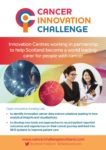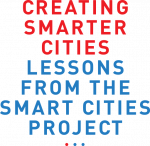Managing Risk By Design – Lessons For Innovation Projects From The Cancer Challenge

Key lessons in how to structure a high-risk project that keeps funders happy and give you flexibility in managing innovation programmes.

Key lessons in how to structure a high-risk project that keeps funders happy and give you flexibility in managing innovation programmes.

Key lessons in how to structure a high-risk project that keeps funders happy and give you flexibility in managing innovation programmes.

As part of the £1M Cancer Innovation Challenge, Product Forge is running a three day long open data event to use synthetic data to develop new ways to work with cancer data in Scotland.

Publicity flyer for the Cancer Innovation Challenge – this is what we’re trying to do.

The Cancer Innovation Challenge has £1M of funding to develop new innovative approaches to using data to deliver better cancer treatment outcomes in Scotland. Here are four ways you can take part in the Challenge.

Scotland lags behind much of Europe in outcomes for cancer patients. The Cancer Innovation Challenge has £1M of funding to develop new innovative approaches to using data to deliver better cancer treatment outcomes in Scotland.

Like! is a €4.2M Interreg Vb project that is developing a ‘local innovation culture’ approach to address the underlying capacity issues that are hampering the improvement of e-government and e-services.

Like! aims to significantly enhance the capacity of the public sector to facilitate and deliver innovation, resulting in the development of a wide range of services using innovative solutions to deliver better public services.

Like! is a €4.2M Interreg Vb project that I set up in 2016 to stimulate innovation in the public sector, and to deliver new solutions that improved public services.

I spent three years managing the Smart Cities Academic Network, which was set up to provide support to the Smart Cities Project. This case study summarises the SCAN approach and identifies the key outcomes.

Smart Cities prioritised improving customer services, adopting user profiling in service design/deliver, and exploring the potential of wireless services.
The project used a combination of co-design, targeted academic research, and mainstreaming/public engagement approaches to deliver high-impact and high-profile results that were used to make cities smarter across Europe.

The Smart Cities project brought together local authorities and academic partners from 13 cities in the North Sea region to develop and deliver better, more customer-focused electronic services. This booklet is a whistle-stop tour of the main findings and conclusions